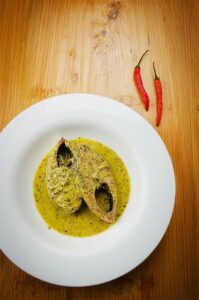Traditional Food in Bangladesh: A Reflection of Rich Cultural Heritage and Flavors
Traditional food in Bangladesh clearly reflects the country’s rich cultural heritage and diverse flavors. The richness and variety of Bangladeshi cuisine make it a true delight for food lovers. With a long history and many regional variations, Bangladeshi food offers everything from spicy curries and hearty dals to aromatic biryani and sweets like chamcham and rasgolla.
Traditional Bangladeshi Food: Heritage and Hospitality
Bangladeshi cuisine draws influence from centuries of culture and local ingredients. Each dish tells a story of tradition and hospitality. Whether you enjoy a home-cooked meal or vibrant restaurant food, Bangladeshi cooking celebrates bold flavors and culinary artistry.
The Richness and Diversity of Bangladeshi Cuisine
Are you a food lover eager to taste Bangladesh’s diverse cuisine? The richness of Bangladeshi food lies in its spices, varied flavors, and traditional dishes like biryani, Hilsa curry, and delicious sweets.
Everyday Staples and Special Dishes
Plain Rice
Rice serves as the staple food in Bangladesh and people usually eat it twice a day, morning and night. They typically enjoy it with different curries. The finer the rice grain, the better it tastes.
Polau and Korma
Polau is a popular dish usually served on special occasions or when guests arrive. It cooks with oil, bay leaves, and onions. In many regions, serving Polau and Korma demonstrates hospitality.

Mustard Hilsa
Hilsa, the national fish, features many cooking methods. The most popular method involves cooking it in a mustard gravy, which pairs well with white rice.
Kachchi Biryani
Kachchi Biryani stands out as a signature dish. Chefs marinate raw meat with spices and place it at the bottom of the cooking vessel. Then, washed and spiced rice layers on top before cooking. Potatoes usually join the mixture.
Meat Curries
Beef, mutton, and chicken curries form essential parts of traditional meals. The more spices they contain, the richer the flavor. These dishes often appear during important events or family gatherings.
Beef Kala Bhuna
Kala Bhuna, a slow-cooked beef curry from Chittagong, boasts an intense flavor due to longer cooking, which gives the meat its distinctive dark color.
Roasted Hotchpotch (Khichuri)
Roasted Hotchpotch combines rice and lentils boiled with turmeric and light spices. On rainy days, people often pair it with fried eggplant or spicy beef curry.
Skewered Meat Sausages with Naan
Skewered meat sausages, grilled over hot coals and served with naan (a special flatbread), enjoy popularity nationwide. Old Dhaka, in particular, is famous for this dish.
Dal (Pulse)
Dal, a thick lentil soup, serves as a daily staple for many families. People usually eat it with rice or bread.
Vorta (Mashed Side Dishes)
Vorta refers to mashed vegetables or fish mixed with mustard oil, green chili, and salt. Common types include mashed potato, dried fish (shutki), tomato, papaya, eggplant (brinjal), and bean vorta.
Popular Street Foods
Fuchka
Fuchka, a crispy snack made from semolina and flour, comes stuffed with spiced mashed chickpeas and potatoes, then served with tamarind sauce.
Kalijar Shingara
Kalijar Shingara, a fried snack made with wheat-based dough and spicy filling, is often enjoyed with tomato and chili sauce, usually accompanied by tea or coffee.
Samuca
Similar to Shingara, Samuca consists of flour, oil, onions, and spices. It is a favorite street food for students and office workers.
Halim
Halim, a slow-cooked stew made from lentils, chickpeas, and meat, offers rich flavor. It is topped with lemon slices, caramelized onions, and coriander.
Pitha (Rice Cakes)
Pitha comes in many types—sweet, spicy, steamed, and fried. Winter marks the peak season for varieties like bhapa, chitai, patisapta, and jhal pitha.
Regional Specialties of Bangladeshi Cuisine
Old Dhaka
Old Dhaka boasts unique foods such as bhaji-puri, luchi, nehari, paratha-bundia, bakarkhani, mohanbhog, tandoori bread, tehari, and biryani.
Chui Jhal of Khulna
In Khulna, a spicy vine called Chui Jhal flavors meat dishes. The meat is boiled with spices, then mixed with Chui Jhal and roasted.
Monda of Muktagacha in Mymensingh
Monda, a sweet made from milk and sugar, originated in Muktagacha roughly 200 years ago, inspired by a dream.
Mejbani Meat of Chattogram
Mezbani meat, cooked with beef and special spices, takes center stage during Chattogram’s large community feasts called mezbans.
Comilla’s Rasmalai
Comilla’s Rasmalai, creamy cheese balls soaked in milky syrup, has been popular since the 19th century and was first sold at Matribhandar sweet shop.
Satkara of Sylhet
Satkara, a lemon-like citrus fruit, flavors meat dishes in Sylhet. It has gained commercial importance and is even exported abroad.
Bangladesh’s traditional food offers more than taste—it provides cultural heritage, local flavors, and warm hospitality. Whether you enjoy biryani in Dhaka or halim in Chattogram, you experience the heart of Bangladesh.
Sources:
https://www.pearlhotelbd.com/about-us/blog/richness-diversity-bangladeshi-cuisine
https://www.msrblogs.com/students/2025/05/07/the-traditional-bengali-food/
